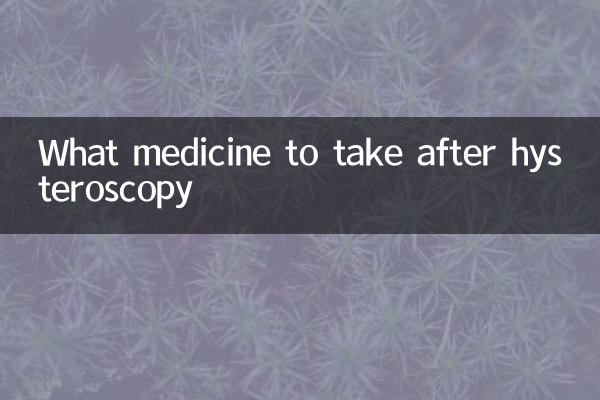What medicine to take after hysteroscopy: Comprehensive guide and analysis of popular topics
In recent years, hysteroscopy has become one of the common gynecological surgeries due to its minimally invasive and fast recovery. Rational medication after surgery is a key link in ensuring recovery results. This article will combine popular topics and hot contents on the Internet for the past 10 days to analyze the post-hysteroscopy medication guide for you in detail and provide structured data references.
1. Classification of common drugs after hysteroscopy

| Drug Type | effect | Common medicines | Use cycle |
|---|---|---|---|
| antibiotic | Prevent infection | Cephalosporin, amoxicillin | 3-7 days |
| Pain relief medicine | Relieve pain | ibuprofen, acetaminophen | On demand for 2-3 days |
| Hemostatic medicine | Prevent bleeding | Tengexyl acid | 3-5 days |
| Hormones | Adjust the inner membrane | Progesterone | Follow the doctor's advice |
2. Recent hot topics and expert suggestions
1.Antibiotic use controversy: Recently, social platforms have hotly discussed "whether antibiotics must be used after surgery." Experts pointed out that it should be decided based on the complexity of the operation. Simple hysteroscopy can be avoided. It is recommended to use preventive medication for therapeutic surgery for 3 days.
2.The popularity of traditional Chinese medicine conditioning increases: Data shows that the search volume of "posthysteroscopy + Chinese medicine" has increased by 45% in the past 10 days. Traditional Chinese medicine experts remind that it is not advisable to take Chinese medicines that promote blood circulation and remove blood stasis within 1 week after the operation. After 2 weeks, the medicine can be used according to the syndrome differentiation of the physical condition.
3.Misconceptions about painkiller use: A survey conducted by a health platform showed that 38% of patients had excessive doses of painkillers. It is recommended not to exceed 4 times a day, and follow-up visits are required in a timely manner when the continuous pain is caused.
| Hot Questions | Frequency of occurrence | Professional answers |
|---|---|---|
| Do you need anti-inflammatory drugs? | 72% | Depend on the type of surgery |
| Can you take blood-activated health products? | 65% | Disabled within 2 weeks after surgery |
| What should I do if I missed the medication? | 53% | Antibiotics need to be taken again, and other drugs can be skipped |
3. Reference for personalized medication regimens
1.Simple hysteroscopy: Usually no special medication is required, ibuprofen can be used to relieve discomfort.
2.Endometrial polyps removal: Antibiotics for 3 days + hemostatic drugs for 3 days, and uterine contractions should be added when there is a lot of bleeding.
3.Uterine adhesion separation: Antibiotics are 5-7 days, and estrogen cycle is required for 2-3 months after surgery.
4.Uterine mediastinal resection: Change oral administration after 3 days of intravenous antibiotics, and use them with short-acting contraceptives to regulate the cycle.
4. Precautions for medication use
1.Drug interactions: Avoid taking painkillers with anticoagulants; antibiotics and probiotics should be separated by 2 hours.
2.Special group of people: People with liver and kidney insufficiency need to adjust the dose; those with allergic constitution use cephalosporus with caution.
3.Response to adverse reactions: If you have rashes, diarrhea, etc., you need to stop the medicine immediately and seek medical treatment.
| Time node | Medication focus | Re-examination indicators |
|---|---|---|
| 0-3 days after surgery | Anti-infection + pain relief | Body temperature, bleeding volume |
| 4-7 days | Stop antibiotics gradually | Secret properties |
| After 2 weeks | Start conditioning and taking medication | Endometrial recovery |
5. Nutritional supplement suggestions
In addition to drug treatment, the nutrition community has recently discussed postoperative nutrition support plans:
1.Protein supplementation: 1.2-1.5g/kg body weight per day, preferably fish, eggs, and soy products.
2.Iron element: For those with excessive bleeding, iron supplements can be supplemented in the short term and taken with vitamin C to promote absorption.
3.Probiotics: It is recommended to supplement during the use of antibiotics, but attention should be paid to the time interval.
Through the above structured data analysis, it can be seen that post-hysteroscopy medication needs to be customized in person, which must not only follow medical standards, but also pay attention to the latest research progress and hot topics on the Internet. It is recommended that patients formulate exclusive medication plans under the guidance of a doctor to ensure safe and rapid recovery.

check the details

check the details